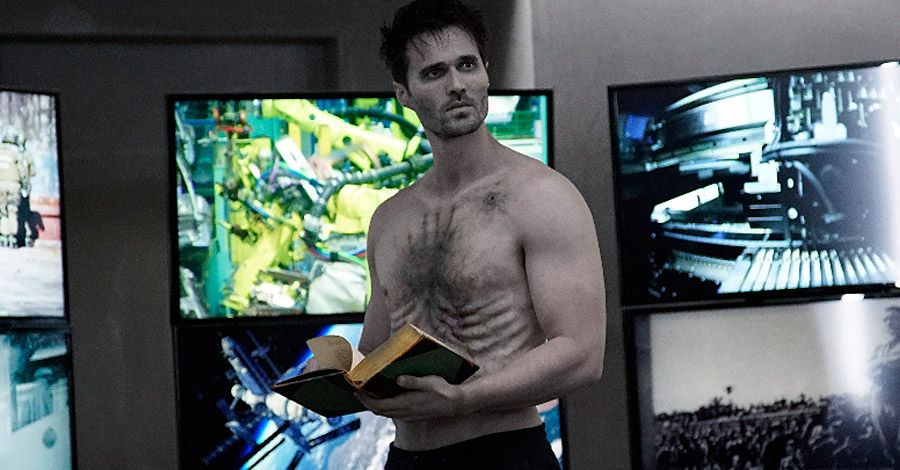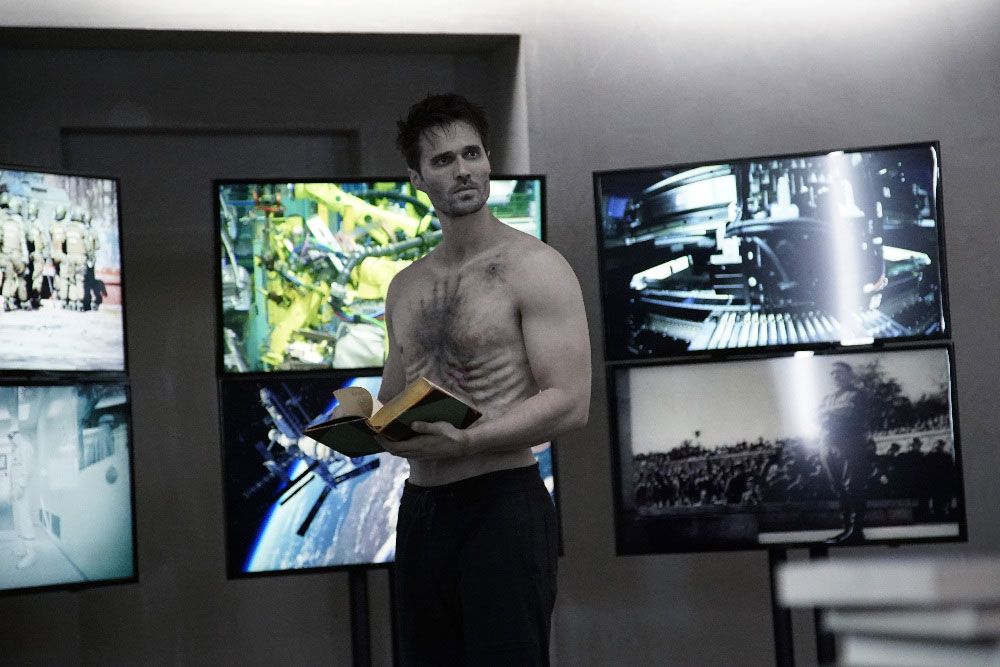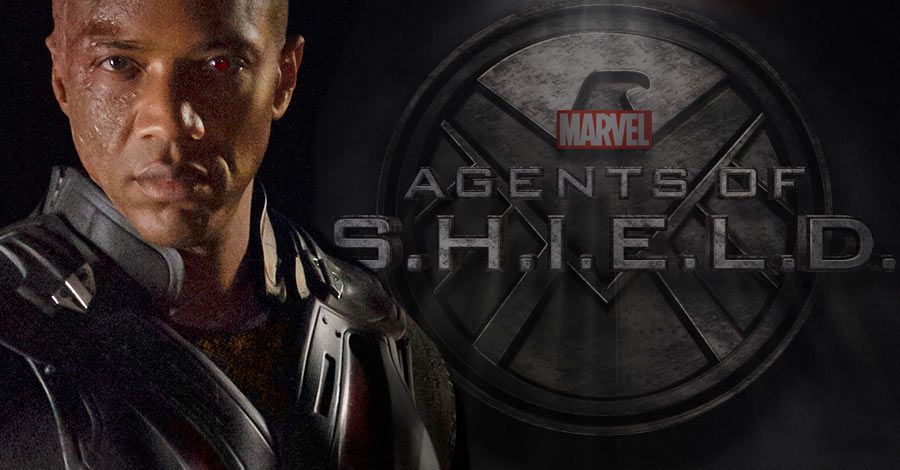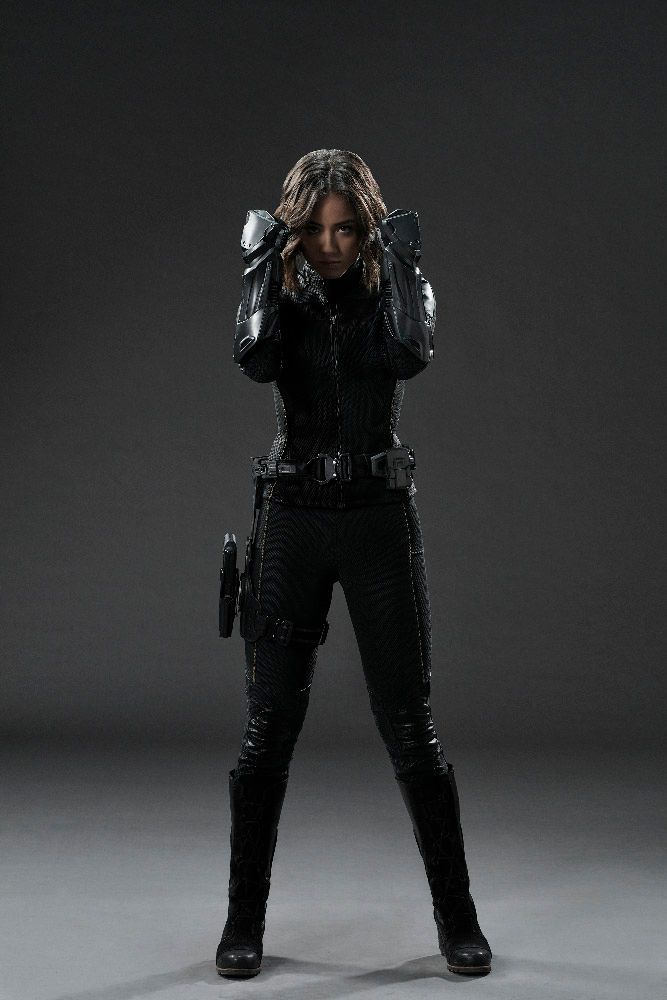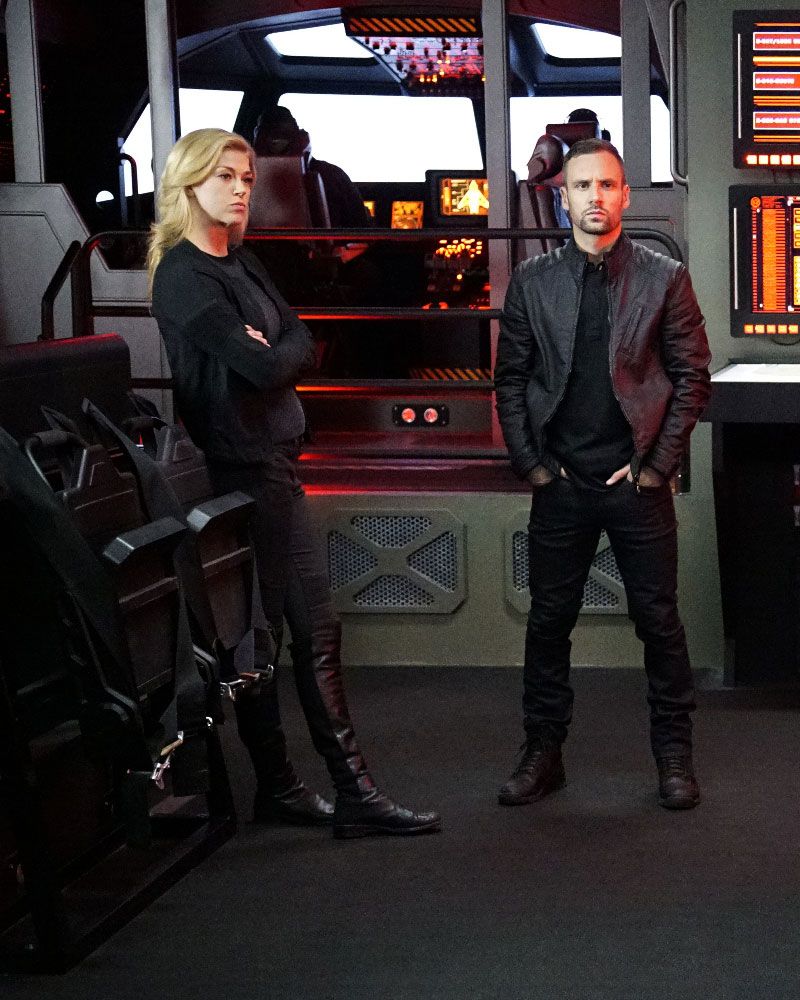With the latest episode of "Marvel's Agents of S.H.I.E.L.D.'s" third season things got much stickier, both figuratively and literally.
The crusading espionage agency's initial attempt to take a step out of secrecy and resume Presidentially-sanctioned legitimacy took a big hit thanks to the machinations of Gideon Malick, while debates over Inhuman rights began to heat up within the team. Meanwhile, the being known as Hive -- currently wearing the face and form of rogue agent Grant Ward (Brett Dalton) -- demonstrated just how deadly it can be, resulting in a grotesque, goo-covered feeding frenzy.
RELATED: Inhuman Assassin On the Loose in Latest "Agents of SHIELD" Promo
During a recent press visit, showrunners Jeffrey Bell, Maurissa Tancharoen and Jed Whedon assembled within S.H.I.E.L.D.'s top secret real-world locale. There, the trio subjected themselves to an interrogation session, as the simmering plotlines hurtle forward -- and knowing that a certain forthcoming Marvel movie will most likely throw even more wrenches into the works.
On interpreting the comic book-based Hive through the show's Grant Ward:
Jed Whedon: Well, I mean, we're huge fans of Brett.
Jeffrey Bell: You wouldn't know it from the things we put him through. But it's true.
Whedon: It is true. This was another way to sort of not only give him a challenge, but to give Ward a new... he's been the baddie for a while, and I thought it was a nice way to escalate this character. As you were just mentioning, there's still memories in there. So there's still an aspect of the man we came to love to hate in there, but we wanted to give it some extra juice and we wanted to give Brett one more challenge where he has to change his character.
Maurissa Tancharoen: Also, I think we're very interested in seeing how our team will respond, eventually, if they happen to cross paths. How they will respond to seeing the man they all know and hate still standing. And if he does have Ward's memories or parts of Ward's personality, how then that will play into scenes with our characters?
Bell: One of the challenges, any time you have an antagonist, [you ask], what's the antagonist's motive? It's like, "I want to rule the world," or it's, "I want revenge," or, "I want love," or, "I want greed."
Whedon: Closure.
Bell: Whatever it is. So to be able to embody an antagonist with somebody we already have feelings for, it's already loaded and interesting to us. So for Ward to then -- or for Brett to embody whatever this thing is, puts a face on it that comes super loaded for us. It's much richer than "Monster X," in the same way that Lash was much more interesting to us once we understood it was Andrew. It's not just the thoughtless monster who's going around doing this stuff. You have the drama of Andrew, you've got his relationship with May, and then suddenly, that whole character became, for us at least, much more intriguing.
On the implications of the royal "we" being used whenever Hive is self-referencing:
Bell: That will actually all be laid out. I think I can say this without spoiling anything: if he was something on the planet that then embodied Will on the planet, and then after Will died, he then embodied Ward, and when he was Will he was able to have memories of Will, there's a fill-in-the-blank sort of conclusion I think that you can take from that.
Whedon: Without him actually saying it.
Bell: Without me saying it. But I do think we've laid out the map of where it's going.
Tancharoen: Or, you just think of the word "hive." What does "hive" mean? "Hive-minded?" Things like that.
Bell: It means "bees."
Tancharoen: It means bees.
On Dalton's extra creepy and uber-gooey scene as Hive:
Whedon: You mean the one where he's dripping and showing off his perfect body? He was real sad. We did tell him right before Thanksgiving that that scene was [coming].
Tancharoen: "Have fun eating."
Bell: Any time an actress is going to be in a bathing suit, or a guy's going to take off his shirt or be covered in goo, you have to give them like a two-week notice. So they can go...
Tancharoen: "No carbs. No carbs."
Bell: Then they show up, because they're already so far ahead of the rest of us, that two weeks are, like, perfect.
Tancharoen: He actually did not have a good time. We promised that the goo was going to be slightly warm. And we attempted to warm it.
Bell: I think it was, initially.
Tancharoen: It was initially warm.
Bell: In take one.
Tancharoen: After a while, it got a little...
Bell: Cold, dripping goo. There were these great photos online of a photographer who was taking pictures of people covered in honey, and he had really large people and babies. And they were all really fantastic pictures. We thought, this is kind of like a birth. We thought, we should do that for him. And how much fun that would be for him. We didn't take [the goo's temperature] into consideration.
On revealing that Creel, the Absorbing Man, was on the side of the angels -- for now -- and whether he'll be sticking around:
Whedon: Well, we have a lot of characters now in the hopper. Deathlok is an example of someone we always have on the shelf. I think Creel sort of fits in that category. One of the things that was interesting about his character in the second season is, he was the first indicator of this Whitehall brainwashing thing. It really wasn't his fault. There is some debate about that in this episode.
We also love his power. We wanted to bring it back just to see that and to do a little bit of the turn of expectations.
Tancharoen: We tend to bring characters back we like, at least once.
Speaking of Deathlok:
Tancharoen: It's always a possibility.
Bell: A behind the curtains peak is, there are times when we want to bring people back. And as you know, there are 400,000 shows on TV right now, and sometimes you want a person, and that person's not available.
Whedon: Because now if they are good, they have their own TV show.
Bell: So we're still figuring it out at the end of the season. But sometimes there are people we'd like to come back, and we can't have them because they're not available.
Tancharoen: Just logistically, it's a puzzle.
Bell: Like the handful of times we had Patton Oswalt is because he had two minutes in his schedule of doing 30,000 things a week.
Tancharoen: Oh, my God. He's the most employed person we know.
Bell: So it's not because we don't love people or because we don't think the fans would enjoy it, or even, it's not because we think, "Oh, this would be a really good story to insert this character into." There are real world logistics that, in general, we don't want fans to think about. But that does play into it sometimes.
On whether S.H.I.E.L.D., which seemed poised to finally emerge from the shadows, is stuck back in secrecy again:
Whedon: Well, yeah. They're sort of on the fence now, trying to figure that out. Once you have the President on your side, it feels like you're pretty well-stacked, but we wanted to make Malick equally dangerous -- his international reach and his influences [run] far and wide, so it's not as easy as getting the secret blessing of the President. He says, "My hands are tied. Yours aren't." He says, "Your gloves are off. Go nuts." That doesn't mean it'll be easy. But he is trying to work towards some sort of -- I think that he doesn't want S.H.I.E.L.D. to be hunted anymore. He is trying to work towards legitimacy, but it's not an easy road.
On whether there are two teams about to split out of the current lineup, as more Secret Warriors enter the picture:
Tancharoen: It hasn't felt like we've been trying to juggle two separate teams. It does feel like it's just an extension of a team that we have, it's just a new dynamic within it.
Whedon: I think it's more that we're trying to reflect Daisy's pursuit of this idea, and her desire to bring people like her together. And that does create complications, as you see in Episode 11, Hunter saying, "Bloody powers...We are different from them. How can we compete?" Everybody who's human in the field in 11 gets kidnapped because they can't compete with these. I think that it's creating a dynamic within the team.
Tancharoen: It's enhanced the varying perspectives that we've already established. Namely, Mac, and also now Daisy, who is kind of taking on -- I wouldn't use the word "militant," but just -- she is proud and Inhuman. We're feeling that pride. It's also part of her just building her leadership role within the team, her being the point person of assembling this team. I think having these new people come into play, it's more about asserting this new arc that we have for Daisy.
On the real-world allegorical implications of the characters' argument over Inhuman rights:
Bell: I think the beauty of doing a genre show is you can make those kinds of metaphors and allegories. And depending on your particular issue or where you come from, you can read into that a lot. I'll say we're aware that we're doing that, but what people put on that is sort of the fun of people interpreting the story.
Whedon: Right, and there's two aspects to it. There's the, "What it's like to be different and to be treated different because you're different," and then as well, we have the debate at the table of, "What happens when a weapon's in the wrong hands?" So both those sides of the argument make that, have equal weight. That makes it fun to write.
On the potential for intra-team conflict over the Inhuman "cure" vaccine:
Whedon: I think it's a powerful idea, and whether or not they find something that works is a question. But I think at the center of the show now is sort of this question of, if you could choose it, would you want to? Would you choose to have this happen to you? Is it a choice? Do people who change, how do we treat them? Do they immediately have freedom to be who they want to be? Or is it a very dangerous weapon that we have to control or at least understand? That's a lot of the stuff that we'll talk about really moving forward forever, because that's the dynamic between regular humans and empowered, enhanced humans or Inhumans.
On planning to address the outcome of the events in "Captain American: Civil War":
Whedon: It will definitely have a ripple effect. I mean, it is one world. So if there's a giant event, it will definitely have a ripple effect in our world.
On how the recent fourth season renewal impacts the third season storytelling:
Whedon: Yeah, what we were planning, in our heads -- there's always kind of more coming. And you have to plan for it, even if it hadn't happened early, which we very much appreciate. We have to work as though it's coming. But it does give us confidence in that, and it allows us to sort of, as we're setting stuff up, do it with a little bit more confidence.
Bell: The only thing that's really helpful would be if they said, "Okay, this is your last," so you know you're working towards a series finale. Like, when we did "Angel," we knew the series finale was coming up, so we worked towards that. But we always have to assume the best, that we're going to go forward and get another season. You want to write that season finale so that it's satisfying, whether there's more or not.
On the possibility of losing Bobbi and Hunter next fall if the proposed "Mockingbird" spinoff series moves forward:
Whedon: They are currently on our show. Our plan is to have them on another show, so we'll have to address it in the story. Where that happens will be for you to find out.
Bell: All I will say is, we hope one day they may have their own show. But while they're on S.H.I.E.L.D., we want to take advantage of who they are, and give the audience as much of their relationship with one another, and with other people, as possible, to make that really satisfying. We are aware that there is a potential immanent end, so they won't be neglected.

